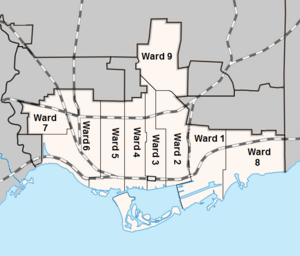The Board of Control of Toronto, Ontario, Canada, was a part of its municipal government until it was abolished in 1969. It served as the executive committee of the Toronto City Council. When it was initially created in 1896 by mandate of the provincial government, it consisted of three Controllers appointed from and by the aldermen, and presided over by the Mayor of Toronto. Beginning in 1904, the Board of Control was directly elected by the city's electorate and consisted of four Controllers, presided over by the Mayor. Each voter could vote for up to four candidates, and the four with the most votes were elected. By tradition the controller who received the most votes would get the powerful budget chief position.
Municipal elections were held in Toronto, Ontario, Canada, on December 3, 1956. Incumbent mayor Nathan Phillips was easily reelected. Jean Newman became the first woman elected to the Board of Control, and topped the poll to become budget chief.
Municipal elections were held in Toronto, Ontario, Canada, on December 5, 1955. Incumbent mayor Nathan Phillips, elected a year earlier, was easily reelected, defeating Controller Roy E. Belyea and Trotskyist Ross Dowson.
Municipal elections were held in Toronto, Ontario, Canada, on December 6, 1954. Incumbent mayor Leslie Saunders was defeated by Nathan Phillips in a close contest.
Municipal elections were held in Toronto, Ontario, Canada, on December 1, 1952. Incumbent mayor Allan Lamport easily won against former alderman Nathan Phillips.
Municipal elections were held in Toronto, Ontario, Canada, on December 3, 1951. Allan Lamport defeated incumbent Hiram E. McCallum in the mayoral election.
Municipal elections were held in Toronto, Ontario, Canada, on December 4, 1950. It was the second time the elections were held in December ; traditionally elections occurred on New Year's Day. Incumbent mayor Hiram E. McCallum narrowly defeated Allan Lamport. The defeat of Norman Freed and the failure of Charles Sims to regain his seat would bring to a close the communist Labor-Progressive Party's presence on Toronto's City Council though the party, and its successor, the Communist Party of Canada would continue to elect members as school trustees for several decades.
Municipal elections were held in Toronto, Ontario, Canada, on January 2, 1950. This was the last time election were held in January, as a ballot measure passed changing the election date to the first Monday in December. This attempt to increase turnout went into effect immediately and an election was held December 4, 1950. The central issue of the campaign was whether to legalize sport on Sundays, with Controller Allan Lamport the main proponent. A referendum was held on the subject, and it passed by a slim margin.
Municipal elections were held in Toronto, Ontario, Canada, on January 1, 1949. Hiram E. McCallum was elected to his first full term as mayor.
Municipal elections were held in Toronto, Ontario, Canada, on January 1, 1948. Robert Hood Saunders was re-elected as mayor in an election that also saw no changes on the Board of Control or City Council.
Municipal elections were held in Toronto, Ontario, Canada, on January 1, 1946. Incumbent Robert Hood Saunders ran unopposed and was acclaimed as mayor.
Municipal elections were held in Toronto, Ontario, Canada, on January 1, 1945. Controller Robert Hood Saunders defeated incumbent Frederick J. Conboy to be elected mayor.
Municipal elections were held in Toronto, Ontario, Canada, on January 1, 1944. Incumbent Frederick J. Conboy defeated Controller Lewis Duncan. The election was a notable defeat for the Co-operative Commonwealth Federation as it lost all representation on city council.
Municipal elections were held in Toronto, Ontario, Canada, on January 1, 1943. Incumbent Frederick J. Conboy was acclaimed as mayor. There was a very low voter turnout, but the election was a victory for the left as the Co-operative Commonwealth Federation (CCF) and Communist Party each won two seats.
Municipal elections were held in Toronto, Ontario, Canada, on January 1, 1940. Incumbent Ralph Day was re-elected mayor. The election saw little change with all incumbent councillors and Board of Control members being reelected.
Municipal elections were held in Toronto, Ontario, Canada, on January 2, 1939. Incumbent Ralph Day was re-elected mayor over former lawyer Lewis Duncan.
Municipal elections were held in Toronto, Ontario, Canada, on December 6, 1937. Ralph Day was elected mayor defeating incumbent William D. Robbins.
Municipal elections were held in Toronto, Ontario, Canada, on December 7, 1936, after being moved up from the traditional New Year's Day vote. William D. Robbins was easily elected mayor to his first full term in office.
Municipal elections were held in Toronto, Ontario, Canada, on January 1, 1936. Sam McBride was elected mayor in a three-way race in which incumbent James Simpson finished third.
Municipal elections were held in Toronto, Ontario, Canada, on January 1, 1935. James Simpson won a surprise victory in the mayoral campaign to become the first socialist candidate elected to the office.
